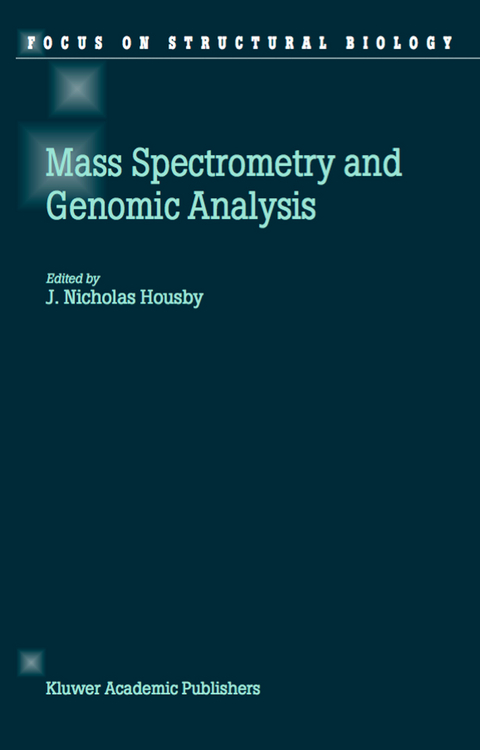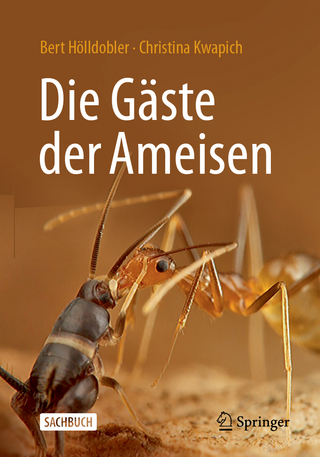
Mass Spectrometry and Genomic Analysis
Springer (Verlag)
978-0-7923-7173-1 (ISBN)
76 2. Short Oligonucleotide Mass Analysis 76 2. 1. Method Outline 76 2. 2. Design of PCR Primers and Fragments for Analysis 78 2. 3. Typical PCR Reaction Conditions 79 3. Electrospray Ionisation Mass Spectrometry 79 Formation of Ions 3. 1. 79 3. 2. Tandem Mass Spectrometry 79 3. 3. Typical ESI-MS Settings for SOMA 80 4. Purification Procedures 80 4. 1. Phenol/Chloroform Extraction and Ethanol Precipitation 80 4. 2. In-line HPLC Purification 81 5. Genotyping Using SOMA 81 5. 1. APC Genotyping in Human Subjects 81 5. 2. APC Genotyping in Min Mice 85 5. Mutation Detection Using SOMA 86 6. 1. Analysis of p53 Mutations in Liver Cancer Patients 86 6. 1. 1. p53 Mutations in Liver Tumours 87 6. 1. 2. p53 Mutations in Plasma Samples 88 7. Advantages and Disadvantages of SOMA 89 8. Future Perspectives 90 9. Acknowledgements 91 10. References 91 CHAPTER 7 WV. Bienvenut, M. Müller, PM. Palagi, E. Gasteiger, M. Heller, E. Jung, M. Giron, R. Gras, S. Gay, PA. Binz, G J. Hughes, JC. Sanchez, RD. Appel, DF. Hochstrasser Proteomics and Mass Spectrometry: Some Aspects and Recent Developments 1. Introduction to Proteomics 93 2. Protein Biochemical and Chemical Processing Followed by Mass Spectrometric Analysis 94 2. 1. 2-DE Gel Protein Separation 95 Protein Identification Using Peptide Mass Fingerprinting and Robots 96 2. 2. 2. 2. 1. MALDI-MS Analysis 98 2. 2. 2. MS/MS Analysis 102 Improvement of the Identification by Chemical Modification of Peptides 106 2. 2. 3.
INTRODUCTION; PREFACE; CHAPTER 1. TJ. Griffin, LM. Smith, Single-Nucleotide Polymorphism Analysis by MALDI-TOF Mass Spectrometry. 1. Introduction. 1.1. MALDI-TOF MS. 2. Analysis of Peptide Nucleic Acid Hybridisation Probes. 2.1. Design of PNA Hybridisation Probes. 2.2. Analysis of Polymorphisms in Tyrosinase Exon 4. 3. Direct Analysis of Invasive Cleavage Products. 3.1. The Invader Assay. 3.2. Direct Analysis of SNPs From Human Genomic DNA. 4. Conclusions. 5. Experimental Methods. 5.1. PNA Probe Synthesis and Preparation. 5.2. PCR Amplification of Exon 4 of the Tyrosinase Gene. 5.3. Hybridisation of PNA Probes to Immobilised Gene Targets. 5.4. MALDI-TOF MS Analysis of PNA Probes. 5.5. Invader Squared Reaction. 5.6. MALDI-TOF MS Sample Preparation of Cleavage Products. 5.7. MALDI-TOF MS Analysis of Cleavage Products. Affiliations. References. CHAPTER 2. LA. Haff, AC. Belden, LR. Hall, PL. Ross, IP. Smirnov, SNP Genotyping by MALDI-TOF Mass Spectrometry. 1. Introduction. 2. SNP Analysis by Single Base Extension of Primers. 3. Materials and Methods. 4. Design Considerations for the SNP Genotyping Assay. 4.1. Design of PCR Product. 4.2. PCR Product Polishing. 4.3. Primer Design Rules for Monoplex SNP Typing. 4.4. Mass Calculations. 4.5. Primer Design Rules for Multiplexed Reactions. 4.5.1. Multiplexing with Primer Pools of Six or Fewer Primers. 4.5.2. Recommended Primer Pool Design: More Than Six Primers. 4.6 Primer Quality. 5. The Single Base Extension Reaction. 5.1. Desalting of Primer Extension Reactions. 5.2. MALDI-TOF Conditions. 5.3. Determination of Bases Added to the Primer. 6. Modification of the SNP Typing Assay to Support Allele Frequency. Determination. 7. Conclusions. 8. References. CHAPTER 3. Hubert Köster, MASSARRAY™: Highly Accurate and Versatile High Throughput Analysis of Genetic Variations. 1. Introduction. 2. MassARRAY™ Technology. 3. Methodology of MassARRAY™ Technology. 4. Diagnostic Applications of MassARRAY™ Technology for Analysis ofDNA Sequence Variations. 5. Application of MassARRAY™ for Confirmation and Validation of Single Nucleotide Polymorphisms. 6. Conclusions. 7. Materials and Methods. 8. Acknowledgements. 9. References. CHAPTER 4. S. Sauer, D. Lechner, IG. Gut, The GOOD Assay. 1. Introduction. 2. SNP Genotyping by MALDI. 3. How to Improve the Analysis of DNA by MALDI. 4. Principles of the GOOD Assay. 5. Variations of the GOOD Assay. 6. Materials and Method of the GOOD Assay. 7. Applications of the GOOD Assay. 8. The Issue of DNA Quality. 9. Physical Haplotyping by the GOOD Assay. 10. Quantitation. 11. Automation of the GOOD Assay. 12. Outlook. 13. References.CHAPTER 5. PH. Tsatsos, V. Vasiliskov, A. Mirzabekov, Microchip Analysis of DNA Sequence by Contiguous Stacking of Oligonucleotides and Mass Spectrometry. 1. Introduction. 2. Magichip properties. 2.1. Production of MAGIChip. 2.2. Activation of Probes. 2.3. Chemical Immobilisation of Probes. 2.4. Preparation of the Target. 3. Hybridisation. 3.1. Theoretical Considerations of Hybridisation. 3.2. Hybridisation on Microchips. 4. Generic Microchip. 5. Principle of Contiguous Stacking Hybridisation. 6. Monitoring. 6.1. Fluorescence. 6.2. Laser Scanner. 6.3. Mass Spectrometry. 6.4. Example of Mutation Detection by CSH and MALDI-TOF Mass Spectrometry. 7. Conclusions. 8. Acknowledgements. 9. References. CHAPTER 6. PE. Jackson, MD. Friesen, JD. Groopman, Short Oligonucleotide Mass Analysis (SOMA): an ESI-MS Application for Genotyping and Mutation Analysis. 1. Introduction. 2. Short Oligonucleotide Mass Analysis. 2.1. Method Outline. 2.2. Design of PCR Primers and Fragments for Analysis. 2.3. Typical PCR Reaction Conditions. 3. Electrospray Ionisation Mass Spectrometry. 3.1. Formation of Ions. 3.2. Tandem Mass Spectrometry. 3.3. Typical ESI-MS Settings for SOMA. 4. Purification Procedures. 4.1. Phenol/Chloroform Extraction and Ethanol Precipitation. 4.2. In-line HPLC Purification. 5. Genotyping Using SOMA. 5.1. APC Genotyping in HumanSubjects. 5.2. APC Genotyping in Min Mice. 6. Mutation Detection Using SOMA. 6.1. Analysis of p53 Mutations in Liver Cancer Patients. 6.1.1. p53 Mutations in Liver Tumours. 6.1.2. p53 Mutations in Plasma Samples. 7. Advantages and Disadvantages of SOMA. 8. Future Perspectives. 9. Acknowledgements. 10. References. CHAPTER 7. WV. Bienvenut, M. Müller, PM. Palagi, E. Gasteiger, M. Heller, E. Jung, M. Giron, R. Gras, S. Gay, PA. Binz, G J. Hughes, JC. Sanchez, RD. Appel, DF. Hochstrasser, Proteomics and Mass Spectrometry: Some Aspects and Recent Developments. 1. Introduction to Proteomics. 2. Protein Biochemical and Chemical Processing Followed by Mass Spectrometric Analysis. 2.1. 2-DE Gel Protein Separation. 2.2. Protein Identification Using Peptide Mass Fingerprinting and Robots. 2.2.1. MALDI-MS Analysis. 2.2.2. MS/MS Analysis. 2.2.3. Improvement of the Identification by Chemical Modification of Peptides. 2.3. The Molecular Scanner Approach. 2.3.1. Double Parallel Digestion Process. 2.3.2. 14C Quantitation of the Transferred Product and Diffusion. 3. Protein Identification Using Bioinformatics Tools. 3.1. Protein Identification by PMF Tools Using MS Data. 3.1.1. Peak Detection. 3.1.2. Identification Tools. 3.2. MS/MS Ions Search. 3.3. De Novo Sequencing. 3.4. Other Tools Related to Protein Identification. 3.5. Data Storage and Treatment with LIMS. 3.6. Concluding Remarks. 4. Bioinformatics Tools for the Molecular Scanner. 4.1. Peak Detection and Spectrum Intensity Images. 4.2. Protein Identification. 4.2.1. Validation of Identifications. 4.3. Concluding Remarks. 5. Conclusions. 6. Acknowledgements. 7. References. INDEX.
| Erscheint lt. Verlag | 31.10.2001 |
|---|---|
| Reihe/Serie | Focus on Structural Biology ; 2 |
| Zusatzinfo | XV, 149 p. |
| Verlagsort | Dordrecht |
| Sprache | englisch |
| Maße | 155 x 235 mm |
| Themenwelt | Naturwissenschaften ► Biologie ► Humanbiologie |
| Naturwissenschaften ► Chemie ► Analytische Chemie | |
| ISBN-10 | 0-7923-7173-9 / 0792371739 |
| ISBN-13 | 978-0-7923-7173-1 / 9780792371731 |
| Zustand | Neuware |
| Haben Sie eine Frage zum Produkt? |
aus dem Bereich


